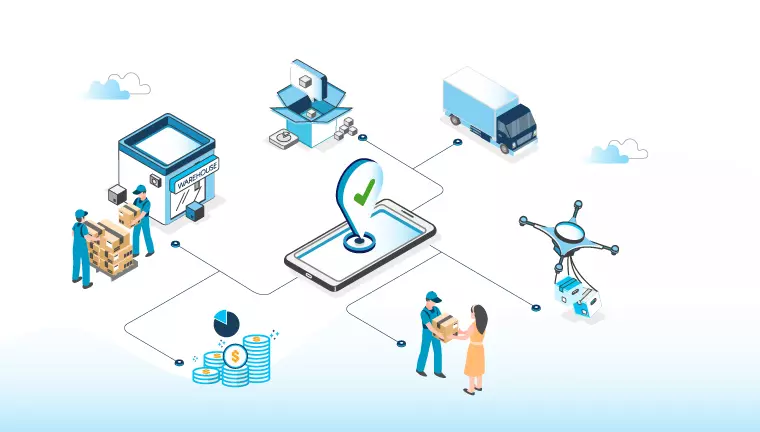Top 5 Benefits of Implementing a DMS Software in Your Supply Chain

In today’s fast-paced and highly competitive market, supply chain efficiency is no longer a luxury—it’s a necessity. Businesses that fail to optimize their distribution networks often find themselves struggling with delayed deliveries, inventory mismatches, dissatisfied customers, and shrinking profit margins. This is where a distribution management system software (DMS) software comes into play.
A DMS software helps manage the entire distribution process—from order processing and inventory management to delivery tracking and reporting—offering companies real-time control and visibility over their supply chain operations. Whether you're a manufacturer, wholesaler, or retailer, implementing a robust DMS can transform your distribution model into a streamlined, data-driven engine.
In this article, we’ll explore the top 5 benefits of implementing a DMS software in your supply chain—and why making this digital shift can give your business a competitive edge.
1. Enhanced Inventory Management and Visibility
One of the most critical challenges in distribution is maintaining the right level of inventory—too much leads to high holding costs, while too little results in stockouts and lost sales. DMS software provides real-time inventory tracking across multiple warehouses, ensuring you always know what’s in stock, what’s on order, and what needs replenishing.
With automated inventory updates, you eliminate manual errors and reduce the risk of discrepancies between actual and recorded stock levels. DMS also helps forecast demand more accurately using historical data and trends, allowing for proactive inventory planning.
Key takeaway: Better inventory control leads to fewer disruptions, optimized stock levels, and improved customer satisfaction.
2. Streamlined Order Processing and Fulfillment
Manual order processing can be riddled with inefficiencies—miscommunications, delays, and errors that cost time and money. A modern DMS automates the entire order-to-delivery cycle, from order entry and approval to picking, packing, and shipping.
This automation speeds up fulfillment times and ensures orders are processed with accuracy and consistency. Integration with ERP and CRM systems also allows seamless data flow between departments, avoiding duplicated work and delays.
Moreover, DMS software provides clear visibility into each order’s status, so your team and customers know exactly where their goods are in the supply chain. This transparency builds trust and enhances the customer experience.
Key takeaway: Automating order fulfillment reduces lead times, lowers labor costs, and minimizes errors.
3. Cost Efficiency and Resource Optimization
Implementing DMS software is an investment that pays for itself over time by significantly reducing operational costs. It helps businesses identify inefficiencies and eliminate waste in areas such as transportation, warehousing, labor, and inventory holding.
For example, a DMS can suggest the most cost-effective delivery routes and optimal warehouse locations to minimize fuel and transportation costs. It can also automate routine tasks like stock counting, reordering, and reporting, allowing your team to focus on higher-value activities.
By analyzing performance metrics and trends, businesses can make informed decisions to reduce overhead and improve profit margins.
Key takeaway: DMS helps you do more with less—cutting unnecessary expenses and increasing ROI.
4. Improved Customer Satisfaction and Service Levels
In today’s customer-centric market, fast and accurate deliveries are a baseline expectation. A delay or incorrect shipment can damage your reputation and result in lost business. DMS software enables faster, more reliable deliveries by ensuring that the right products reach the right customers at the right time.
With real-time delivery tracking and automatic notifications, customers are kept informed throughout the process. This visibility builds trust and reduces the need for support inquiries. DMS also helps you maintain accurate service levels by providing insights into order accuracy, delivery times, and fulfillment rates.
By consistently meeting (or exceeding) expectations, businesses can foster loyalty and gain a competitive edge.
Key takeaway: A reliable DMS improves service delivery, leading to happier customers and repeat business.
5. Data-Driven Decision Making and Reporting
Data is the backbone of any efficient supply chain. A powerful DMS doesn’t just manage processes—it collects and analyzes valuable data that can be used to improve operations continuously.
Custom dashboards and detailed reports give you insight into KPIs such as delivery performance, inventory turnover, order accuracy, and cost efficiency. With this data at your fingertips, you can quickly spot trends, identify bottlenecks, and make informed decisions to enhance your distribution strategy.
Additionally, having centralized access to historical data enables better forecasting and demand planning, helping you stay ahead of market fluctuations.
Key takeaway: Actionable insights from DMS analytics enable smarter, faster, and more strategic decision-making.
Conclusion: DMS as a Strategic Advantage
The benefits of implementing a DMS software go far beyond operational efficiency. It empowers businesses to scale faster, adapt to changes in the market, and deliver exceptional customer experiences. In a world where supply chain performance directly impacts brand reputation and profitability, a well-integrated DMS can be the competitive differentiator your business needs.
Whether you’re looking to streamline warehouse operations, cut costs, or improve delivery performance, DMS software offers a centralized platform to achieve these goals.
If you haven't yet explored how a DMS can transform your distribution operations, now is the time. The future of supply chain management is digital—and a smart DMS is at the heart of it.
- Vibnix Blog
- Politics
- News
- Liberia News
- Entertainment
- Technology
- Образование
- Art
- Causes
- Crafts
- Dance
- Drinks
- Film
- Fitness
- Food
- Игры
- Gardening
- Health
- Главная
- Literature
- Music
- Networking
- Другое
- Party
- Religion
- Shopping
- Sports
- Theater
- Wellness



